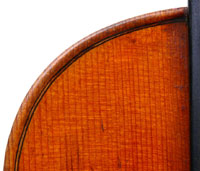Ref : 0574
A very fine English violin by
William DICKIE
(Died 1899)
Wentworth, 1894
This is my personal instrument of choice. I have access to many fine violins on which I play regularly, but I always come back to this one. Why? It has superb tone, power and projection, and yet plays with the greatest of ease. This is truly a giving and responsive violin that requires very little effort to work with.Furthermore, it is really beautiful. The photography doesn't do justice to the beauty of the varnish, particularly on the back. The entire violin is covered in the most exquisite golden honey coloured, soft oil-based varnish, severely worn in places. The modelling is unusually elegant, balanced and crisp, the scroll is superbly refined and balanced. These features, along with its superb tonal properties, make this a violinist's violin of a high order.
The back is in two pieces of nicely flamed maple with an attractive but irregular curl - the two halves are unmatched. Sides, neck and scroll are likewise of well-flamed maple. The top is of fairly widely-grained tone spruce. The current fittings are of rosewood.
Little is known about William Dickie, He went to Cremona to study violinmaking early in his life. He then spent several years there working in various studios, thoroughly absorbing the Cremonese traditions and styles. He returned to England and from 1876 to 1899 (apparently the year of his death) he lived and worked in Wentworth, near Rotherham in England. Sir James Smith was a collector of Dickie's instruments and boasted of their fine tone.
Both the authoritative French volume by René Vannes and William Henley refer to Dickie's work as essentially Cremonese and comment on the good tone and beautiful golden varnish.
When in London recently, I had the opportunity to examine and play on two violins by Vincenzo Panormo. Dickie is much in this league, from a workmanship perspective and certainly tonally, but appears to have been far less prolific. I regularly play on a good Degani and have access to a Scarampella, a Gagliano and a Fagnola, yet this violin by William Dickie supersedes them.
Dickie's instruments will probably become very sought-after in the course of the 50 years or so.
If anyone has more information on William Dickie, or owns any of his instruments, please contact me.
 |
 |
 |
||
 |
Dimensions : Back length: 35.7 cm
Condition : This violin is in excellent condition. The only repair it has had was to a small crack that started from the lower end of the left f-hole, and ran downwards for about 6 cm. This has been professionally repaired with 3 cleats inside and is invisible from the outside. The varnish is somewhat worn in the top right sector of the front and in areas on the back.
Provenance : This violin belonged to a professional orchestra player who upon retirement gave it to a non-musician in about 1965. It then remained unused until it was bought by Johan Grobbelaar in 2009. It is currently on loan to a professional musician in Johannesburg.
Price : Withheld
 |
 |
 |
 |
 |
 |
 |
 |
 |
|||||